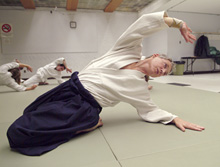James Gavin on choosing a sport

James Gavin stretches at the beginning of his aikido class.
Photo by Kate Hutchinson
Sport builds character. The old adage is still relevant, but what often hasn't been discussed is how one's style can or should influence the choice of a sport.
James Gavin, of Concordia's Department of Applied Human Sciences, has created a model to help those who can't stick to a regular exercise routine. Using seven dimensions of personal style, a person can find the most suitable sport or active pursuit.
The seven dimensions are: sociability, spontaneity, self-motivation, aggressiveness, competitiveness, mental focus and risk-taking.
Gavin's findings were published in the December issue of The Physician and Sportsmedicine. The research has also been published by Reuters and has appeared in newspapers across Canada.
"There have been many armchair psychology attempts on this subject in the past but little research behind them," Gavin said. "We know exercise can reduce anxiety and improve mood, but choosing the proper activity depending on the person's mental makeup can help the person stick to something, enjoy it more, and even learn some important lessons for life.”
"Someone who is not sociable, can't focus on one task and doesn't like competition probably shouldn't take up something like racquetball. They might be better off taking up something that allows them to go at their own pace without having to focus, like swimming, walking or jogging."
Gavin says it is not always this clear-cut, however. “Individuals who regularly exercise can take the model further by choosing activities that run against the grain of their personal makeup. This can serve to make their own behavioural patterns more like those required by the activities they choose.”
Clinicians who understand how the seven personal style dimensions relate to various sports can help their patients identify activities that work for them.
"Perhaps a more fundamental issue influencing exercise participation concerns the individual’s sense of physical competency," Gavin said. "Self-efficacy theory argues that an individual’s sense of competency influences involvement in specific behaviours.
"For instance, if someone does not feel competent to swim, he or she will avoid the water. In exercise psychology, research clearly suggests that increasing patients’ physical self-efficacy will improve exercise participation.
“Once the question of competency has been assessed, it seems logical to then identify activities that are more suited to patients’ personal styles or personalities, rather than directing them toward ones that don’t interest them."
Gavin says that all physical activities make different psychological demands of participants. These demands may match or mismatch an individual's personal style.
"Athletes who play rough, competitive sports like hockey or football are likely to reinforce aggressive behaviour patterns as a result," Gavin said. "You don't see too many yogis getting into bar fights!"
Gavin has participated in a variety of activities himself, including modern dance and competitive swimming. Now his chosen sport is aikido, which he says has taught him “to stand his ground in the midst of strong conflict."
Gavin hopes his model will help people think beyond the stereotypes of sports and fitness activities and experiment with new forms of physical involvement that have greater potential for influencing personal development. "This whole area needs much more research," he said. "I want people to see that physical activity is at least as relevant to the mind as it is to the body."